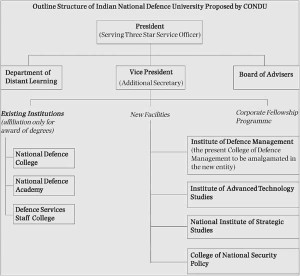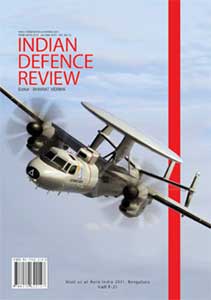Appraisal of CONDU Proposal
The Task Force had expressed its dissatisfaction at the existing state of research on strategic issues on four counts:-
- Limited research activities.
- Poorly managed, funded and structured research regime.
- Lack of orientation to public policy.
- Lack of synergy between research and official requirements.
The Task Force, therefore, suggested establishment of NDU. GoM accepted need for NDU purely for long term defence and strategic studies as it felt that ‘policy orientation and synergy between the academic community and governmental functionaries were lacking’. Other requirements like training needs of the services and distant learning were added later on by CONDU.
 The primary thrust of CONDU has been that the Indian policy makers are bereft of advice from the academic community of well researched security concerns. It felt that research lacks in policy orientation and hence, suggested new facilities under INDU. CONDU, quite inexplicably, failed to identify underlying reasons for this infirmity. Had it done that, it would have realised that there was no shortage of well-run defence research institutes/centres and competent scholars. The root causes for the malady lay elsewhere, as given below:-
The primary thrust of CONDU has been that the Indian policy makers are bereft of advice from the academic community of well researched security concerns. It felt that research lacks in policy orientation and hence, suggested new facilities under INDU. CONDU, quite inexplicably, failed to identify underlying reasons for this infirmity. Had it done that, it would have realised that there was no shortage of well-run defence research institutes/centres and competent scholars. The root causes for the malady lay elsewhere, as given below:-
- India lacks a tradition of long term strategic thinking and policy planning. Even within the Government, there is a total indifference to advance planning.
- Policy makers are averse to accept external advice as they consider themselves to be fully equipped to take decisions in national interest.
- Day-to-day routine business takes precedence over futuristic thinking and planning.
- Individualistic and compartmentalised mindset of functionaries hinders wider consultations and dialogue. They are highly protective of their turf and consider collective decision making as an encroachment of their domain. They decline to share information with others.
- Functionaries lack knowledge and training to take defence related decisions.
- Finally, Indian functionaries resent criticism and difference of opinion. They do not take kindly to dissention and expect academicians to toe the official line. That is the reason why all Government-funded institutions get coerced into producing placid and non-contentious research studies. The value of such studies, therefore, becomes suspect.
India boasts of some of the finest institutions involved in research and analysis of strategic subjects in Asia (see accompanying boxes). The Institute for Defence Studies and Analysis (IDSA) and the United Service Institution of India (USI) have commendable track records. Full potential of these institutions has never been utilised by the Government functionaries. It is not known if these institutions ever failed to deliver when requisitioned by the Government for any specific study/analysis. CONDU has totally neglected the expertise, brain-power and infrastructure with these and other premier defence institutions.
Indian functionaries resent criticism and difference of opinion. They do not take kindly to dissention and expect academicians to toe the official line.
Recommendations made by CONDU can be grouped as follows:-
- Creation of additional facilities.
- Amalgamation of existing facilities.
- Corporate fellowship programme.
- Distant learning programme.
- Affiliation of existing institutions.
Creation of New Facilities
CONDU has recommended establishment of some additional institutes. Their envisioned role vis-à-vis available facilities has been examined in the following paragraphs. Creation of new research facilities through INDU ought to be justified only if the envisaged research and education functions cannot be performed by existing institutions.
National Institute of Security Studies. CONDU has sought establishment of National Institute of Security Studies for conducting required research programmes on all strategic issues of concern to the Government to enable it to take fully informed decisions.
These functions can easily be assigned to IDSA, which is considered to be the premier strategic and security studies think tank in India. Over the years the Institute has enlarged its focus of research from defence studies to cover issues of national and international security.
 The Institute has a well-qualified multi-disciplinary research faculty of over 50 scholars drawn from academia, defence forces and the civil services. Its library has an excellent collection of more than 50,000 books covering national security, defence strategy, international relations, conflict and peace studies and related subjects.College of National Security Policy. Establishment of a College of National Security Policy has been recommended by CONDU ‘to act as a think tank contributing to security policy formulation’.
The Institute has a well-qualified multi-disciplinary research faculty of over 50 scholars drawn from academia, defence forces and the civil services. Its library has an excellent collection of more than 50,000 books covering national security, defence strategy, international relations, conflict and peace studies and related subjects.College of National Security Policy. Establishment of a College of National Security Policy has been recommended by CONDU ‘to act as a think tank contributing to security policy formulation’.
National Defence College (NDC), founded in 1960 with identical objective, is fully equipped to fulfill the above requirement. The study at the College relates to strategic, economic, scientific, political and industrial aspects of national defence. The scope of study includes an examination of internal and external threats to the security of India as well as possible trends for the next ten years.
NDC provides future decision-makers with the necessary skills and background for filling senior positions in national security and associated fields.
Studies include analysis of diverse factors such as foreign policies of other nations, conflicts over vital economic interests or territorial claims and factional, communal or political differences. Formulation of national strategy for various contingencies up to and including the outbreak of war is also analysed. NDC provides future decision-makers with the necessary skills and background for filling senior positions in national security and associated fields.
Institute of Advance Technology Studies. As emerging technologies have a profound influence on defence systems and doctrine, CONDU has recommended setting up of an Institute of Advanced Technology Studies at Bangalore in a new campus.
- However, CONDU overlooked the existence and potential of Defence Institute of Advanced Technology (DIAT), located near Pune. It is the foremost institute in the field and functions under Defence Research and Development Organisation (DRDO). It has been accorded the status of a ‘deemed university’ in recognition of its academic excellence. Its charter includes the following:-
- To impart higher education and training in various fields of science and technology having a bearing on defence requirements in general and weapon systems in particular to the officers of MoD, public sector undertakings, private sector and others.
- To carry out research, design and development activities with a view to maintain adequate standards required for (i) above.
- To maintain active interaction and liaison with Universities and other civil and defence teaching institutes in the country and abroad for to and from flow of scientific knowledge.
The Institute has some of the best scientific brains in India and possesses infrastructure spread over 500 acres of area. Being under DRDO, it has the added advantage of close interaction between the scientists, field staff and the user services.
Amalgamation of Existing Facilities
CONDU has sought establishment of an Institute of Defence Management (IDM) at Secundrabad by amalgamating existing College of Defence Management (CDM). It has also recommended establishment of a Centre for Research and Policy and a College of Industrial Research and Management under IDM.
Synergy between research scholars and Government functionaries can only be achieved by regular interaction and mutual confidence. There is a need to inculcate and nurture strategic thought in body politic.
Justification for such a recommendation is not clear. An easier and simpler option would have been to exploit full potential of CDM by enlarging its charter and scope. Founded in 1970, CDM strives to be the nation’s leading centre of excellence in developing management thought with a focus on optimising the effectiveness of the defence services. Its vision is to fulfill the need for enlightened leadership, resource optimisation and effective decision making ability to meet the ever-increasing challenges to national security.
CDM’s highly reputed Research and Consultancy Faculty undertakes project studies for the three services and other organisations every year. The College has three teaching faculties – Faculty of Organisational Behaviour, Faculty of Decision Analysis and Faculty of Resource Management.
Corporate Fellowship Programme
This is also an add-on by CONDU. Fellowship programmes in strategic studies are being conducted by a number of universities, although the standard of research and instructions is certainly not of the requisite standard. The most prudent option is to improve standards in the universities. Additionally, USI can also be assigned this task. Located at New Delhi, USI is an autonomous body and already has a number of Fellowship Chairs for research projects. It has three centres under it, i.e. Centre for Strategic Studies and Simulation, Centre for Armed Forces Historical Research and Centre for United Nations Peace Keeping.




